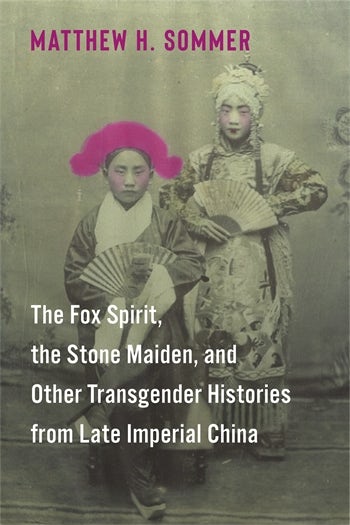We are delighted to pass along news of the awards, prizes, and fellowships announced at the recent meeting of the American Society for Legal History, starting with the Peter Gonville Stein Book Award.
About the award: "The Peter Gonville Stein Book Award is awarded annually for the best book in non-US legal history written in English. This award is designed to recognize and encourage the further growth of fine work in legal history that focuses on all regions outside the United States, as well as global and international history. To be eligible, a book must be published during the previous calendar year."
This year's award went to Matthew Sommer (Stanford University) for The Fox Spirit, the Stone Maiden, and Other Transgender Histories from Late Imperial China (Columbia University Press, 2024). The citation:
 Looking back at a lifelong engagement with Chinese legal history in
the Ming and Qing dynasties, with a special focus on gender and
sexuality, Matthew Sommer breaks new ground in his most recent book, The Fox Spirit, the Stone Maiden, and Other Transgender Histories from Late Imperial China
(Columbia, 2024), uncovering several cases with transpeople who have
been hiding in plain sight in the source material. The core of the book
is based on routine and palace memorials from the First Historical
Archives in Beijing, but Sommer also supplements his deep source base
with popular tales about “the strange,” treaty port journals and
newspapers, case books, legal codes, and compendia of traditional
Chinese medicine. In contrast to his previous two books, which theorized
about gender and sexuality based on thousands of legal cases, this book
presents a concise series of case studies that identify what Sommer
calls “transgender paradigms” in Chinese legal and social history. Among
the figures that appear in these microhistories, we encounter a diverse
set of gender non-conforming individuals, including eccentric midwives,
cross-dressing clergy, unconventional physicians, and fox spirit
mediums. One of the most interesting findings of the book is that while
magistrates who prosecuted cases against trans people tended to rely on
legal provisions banning heterodoxy, they were often confronted with the
fact that there were no appropriate statutes that could prosecute cases
involving trans people. Instead, they had to resort to interpretations
of law that reveal interesting assumptions about gender, the body, law,
procreation, and the fear of the unknown. This compelling and generative
book is both a deep dive into complex and dense sources as well as a
refreshing intervention into several subfields of legal history.
Looking back at a lifelong engagement with Chinese legal history in
the Ming and Qing dynasties, with a special focus on gender and
sexuality, Matthew Sommer breaks new ground in his most recent book, The Fox Spirit, the Stone Maiden, and Other Transgender Histories from Late Imperial China
(Columbia, 2024), uncovering several cases with transpeople who have
been hiding in plain sight in the source material. The core of the book
is based on routine and palace memorials from the First Historical
Archives in Beijing, but Sommer also supplements his deep source base
with popular tales about “the strange,” treaty port journals and
newspapers, case books, legal codes, and compendia of traditional
Chinese medicine. In contrast to his previous two books, which theorized
about gender and sexuality based on thousands of legal cases, this book
presents a concise series of case studies that identify what Sommer
calls “transgender paradigms” in Chinese legal and social history. Among
the figures that appear in these microhistories, we encounter a diverse
set of gender non-conforming individuals, including eccentric midwives,
cross-dressing clergy, unconventional physicians, and fox spirit
mediums. One of the most interesting findings of the book is that while
magistrates who prosecuted cases against trans people tended to rely on
legal provisions banning heterodoxy, they were often confronted with the
fact that there were no appropriate statutes that could prosecute cases
involving trans people. Instead, they had to resort to interpretations
of law that reveal interesting assumptions about gender, the body, law,
procreation, and the fear of the unknown. This compelling and generative
book is both a deep dive into complex and dense sources as well as a
refreshing intervention into several subfields of legal history.Honorable Mentions went to: Lauren Benton (Yale University) for The Called it Peace: Worlds of Imperial Violence (Princeton University Press, 2024) and to Samuel Fury Childs Daly (University of Chicago) for Soldier’s Paradise: Militarism in Africa after Empire (Duke University Press, 2024).
Congratulations to all the honorees!
-- Karen Tani